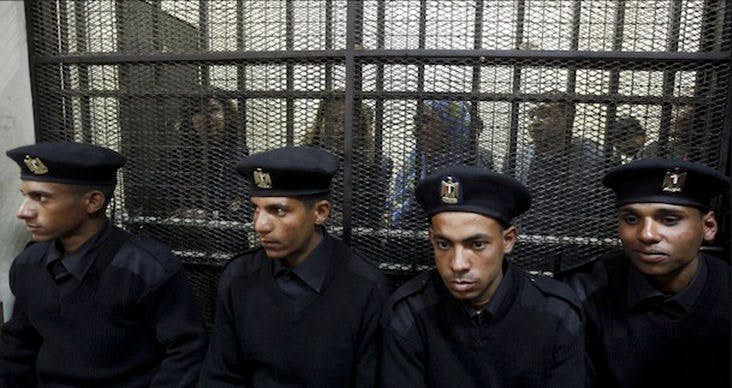HRF calls on the Egyptian government to drop all charges and vacate the arbitrary convictions against members of non-governmental organizations. In 2011, under the rule of the interim military body, the Egyptian government brought a criminal investigation against foreign human rights organizations, accusing them of “illegally receiving foreign funding.” Known as the “173 of 2011” case, the trial ended in 2013 with the sentencing of foreign and domestic employees of international organizations to up to five years in prison. Since February 2016, the Egyptian government has revived its crackdown, now targeting independent domestic groups by raiding their offices, issuing closure orders and travel bans, interrogating activists and freezing their assets.
“The Egyptian revolution of 2011 succeeded in overthrowing Mubarak’s 30-year old military dictatorship. Egyptians’ aspirations for freedom and democracy, however, were never fulfilled. Post-revolution governments are using increasingly repressive tactics, including cracking down on civil society, to impede any democratic progress,” said HRF president Thor Halvorssen. “The recent attacks on non-governmental organizations led by el-Sisi's government demonstrates that the Egyptian people still live under the oppression of a dictator, deprived of their most basic right to participate in the civil and political life of their country,” added Halvorssen.
In 2013, under the leadership of Mohamed Morsi, the Cairo Criminal Court sentenced 43 Egyptian and foreign employees of five international organizations, including Freedom House, to up to five years in prison. The defendants were accused of violating the Egyptian Penal Code by “receiving illegal funds,” “working for unlicensed institutions,” and “illegally operating pro-democracy programs and stirring unrest.” Though most of the foreign workers had faced a travel ban since the start of the investigation, they were able to leave the country before the verdict was announced after paying a multimillion-dollar bail. The judgment also ordered the closure of the five organizations’ offices.
In 2016, a wave of prosecutions on 37 local independent organizations confirmed el-Sisi’s determination to eradicate any remnants of civil society. In February, a torture rehabilitation group was served an administrative closure order after publishing a report that highlighted hundreds of torture incidents perpetrated by Egyptian security forces. The following month, a human rights lawyer was charged with “establishing an unlicensed entity,” “conducting human rights activities without a license,” and “spreading false information” after submitting a draft torture bill to the presidency. In May, the Cairo Criminal Court is set to decide on the asset freezing of both the founder of the Egyptian Initiative for Personal Rights and the director of the Arab Network for Human Rights Information, who are accused of “illegally receiving foreign funds.” The judge investigating the case has issued a gag order to prevent any reporting on the case.
“By constraining civil society, Egypt is violating the right to freedom of association guaranteed in Article 75 of its own constitution and in the International Covenant on Civil and Political Rights, of which Egypt is a signatory,” said Javier El-Hage, chief legal officer of HRF. “In 2014, President el-Sisi amended Article 78 of the Penal Code to include a life sentence penalty against individuals receiving foreign funding with the aim of ‘pursuing acts harmful to the national interest’ or ‘destabilizing the general peace.’ These vaguely worded provisions are clearly intended to criminalize legitimate activism work within Egypt’s civil society,” added El-Hage.
Human Rights Foundation (HRF) is a nonpartisan nonprofit organization that promotes and protects human rights globally, with a focus on closed societies. HRF’s International Council includes human rights advocates George Ayittey, Palden Gyatso, Garry Kasparov, Mutabar Tadjibaeva, Elie Wiesel, and Harry Wu.
Contact: Noemi Gonzalo-Bilbao, (212) 246-8486, [email protected].
